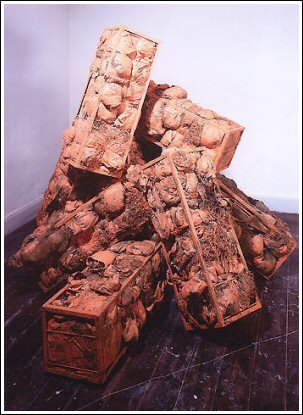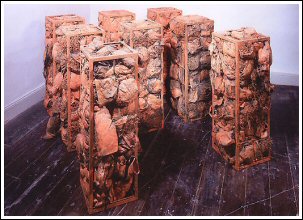Sound and Vision
Dániel Péter Biró
Variations
Laurel Point Inn
1 pm, Friday January 27th
Dániel Péter Biró first started his musical studies at the Bartók Conservatory in Budapest, Hungary (1985-1988). He later attended the Musikhochschule Bern (1990-92), at the Musikhochschle Würzburg (1992-1995), and at the Musikhochschle Frankfurt (1992-1998) where he studied with Bernhard Kontarsky and Hans Zender as a Fulbright scholar (1990-1992). He has also worked with Michael Jarrell in Vienna in 1994-1995. In 1995, he did folk music research at the Academy of Science in Budapest. He received a DAAD research grant for study in Israel in 1997 as well as a commission for an Elecroacoustic Opera from the Neue Horizonte-Bern / Schlachthaus Theater in Bern, Switzerland in 1998. From 1998-2004 he received a Naumberg fellowship from Princeton University for Ph.D. studies in Music and Judaic studies. There he studied with Paul Lansky (composition and computer music) and Peter Westergaard (composition and analysis) Kofi Agawu (music theory) with Peter Jeffery (plainchant) and Peter Schaefer (Judaic studies). In 2000 he received grants from Center for Near Eastern Studies, Council on Regional Studies, and the Association of Princeton Graduate Alumni for purposes of Hebrew study and dissertation research at Haifa University, Israel.
His works have been performed at the Alte Oper-Frankfurt, at the Konzerthaus in Vienna, at the Bartók Festival in Szombathely, Hungary and have been broadcast on Swiss (DRS 2), Austrian (ORF), German (HR 2), and on Italian public radio (RAI). He performed as a soloist with the Bern Symphony in 1997. In 1999 he was awarded the Hungarian Government’s Kodály Scholarship for Hungarian Composers. His string quartet “Lizkor VeLishkoach" ("To remember and to Forget)” was commissioned by the Villa Bernau in Wabern, Switzerland in 2000. In 2001 his piece, “The Crossing (Daf),” based on a text by Franz Kafka, was performed as a commissioned composition of the Stuttgart Opera. In 2003 he received a dissertation research grant from the Princeton University Program in Judaic Studies. He was resident artist at Atlantic Center of the Arts in 2002. He received a summer research grant from Princeton University Council on Regional Studies in 2003 and a dissertation research grant from the Princeton University Program in Judaic Studies in 2003-2004. He took part in the Akademie Schloss Solitude in 2003. There the first part of his composition “Mishpatim” (“Laws”) for voices, percussion solo and chamber ensemble, was performed by the Ensemble SurPlus. Based on a text from the Hebrew Bible, the composition deals with Kabalist concepts of text/music relationships, as a system of correlation between word, number and organized sound is formed by means of Hebrew number symbolism (gematria). An analysis and accompanying CD of “Mishpatim” will be published by the journal Perspectives of New Music in November 2005.
Dr. Biró completed his Ph.D. in composition at Princeton University in 2004. The theoretical part of his dissertation consisted of a comparative study of Hungarian laments, Hebrew bible cantillation and 9th century plainchant from St. Gallen. In 2004 Dániel Péter Biró was appointed Assistant Professor of Composition and Music Theory at the University of Victoria in Victoria, British Columbia, Canada. He is currently working on a composition for the Ensemble Recherche and soprano Petra Hoffmann commissioned for the 2006 Darmstadt Festival.
Media example
Listen to mp3 - variations


|
Variations
Variations was a sound installation commissioned by the Villa Bernau in Wabern, Switzerland. The original sound installation was created in coordination with the sculptor Wolfram Renger. Renger's sculptures deal with the historical forming of prisons of cultural and artistic identities.
Originally the sounds came, via loudspeakers, from the sculptures themselves. The installation was divided into three spatialized parts. Penalty dealt with the problems of industrial death via the death penalty. Lizkhor dealt with questions of musical/physical closure (via exploring questions of the US prison system) and the relationship of closure to cultural memory. Borders dealt with questions of the limits of closure (exploring European border problems) and its relationship to the forming of cultural identities.
All three parts employed documentary material dealing with the U.S. prison system, the death penalty and European border conflicts. These sounds became juxtaposed and integrated into musical processes. The sounds connected and reacted to the context, which Renger established, by both allowing for a more subjective reaction to the sculpture's objective violence, and by connecting the abstract qualities of the "caged" form with new musical/acoustic spaces and temporal "frames." This space acted as an exterior prison for the listener/ observer to perceive the intertwining of various prison and border scenes, music, sounds of the environment and more "abstract" musical material. The sonorous space with its overlapping temporal frames, also explored questions of the "variability" of identity formation, borders/border problems and prison systems.
In his lecture, Dániel Péter Biró will talk about his experience working on this sound installation as well as how the installation responds to his string quartet Lizkor VeLishkoach and to Franz Schubert’s String Quartet in G D 884.
|
|
|
|

